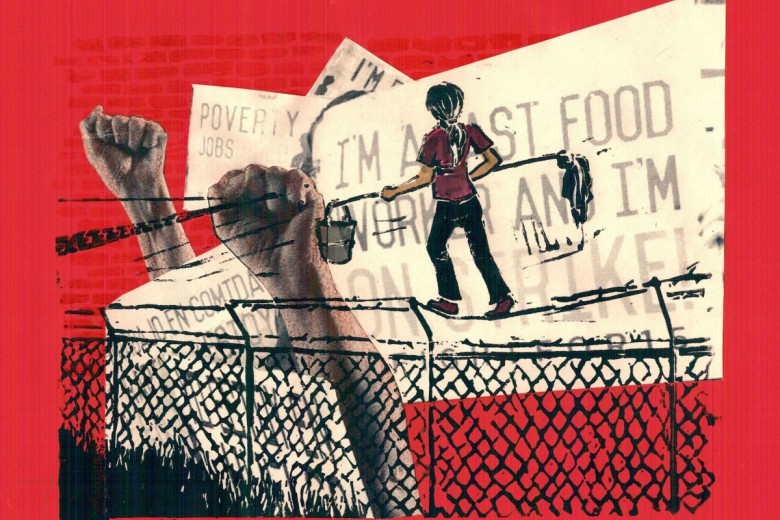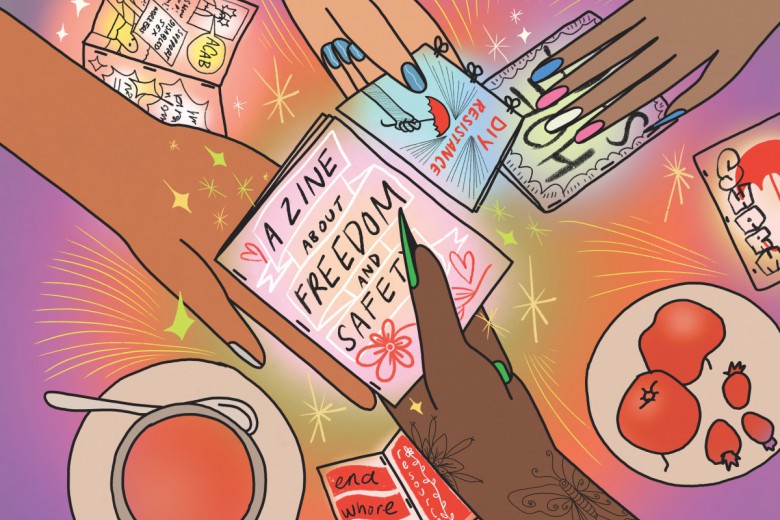
February 2009, Saint Mary’s University, Halifax. A student spots a poster for a presentation titled “Echoes of the Holocaust” by Jose Ruba of the Canadian Centre for Bio-Ethical Reform. This presentation, she learns after further investigation, has nothing to do with remembering the atrocities committed against Jews. Instead, it uses graphic imagery to equate abortion with genocide, implicitly comparing women who have abortions to Nazis.
Deeply offended by the comparison, this student forwards the announcement of the presentation to friends, and news quickly spreads through pro-choice networks. The university administration is barraged with phone calls and emails calling for the event to be shut down on the grounds that it amounts to harassment and is offensive to women, especially those who have had abortions.
The administration declines to intervene, and the event goes ahead. Shortly after the event begins, a group of about 10 women and their allies enter the room, chanting and blocking the projector with the intent of disrupting the presentation. Police are called, and arrests of pro-choice women are prevented only by a timely intervention on the part of a university administrator. The presentation is moved to a church off campus.
As a result of her participation in the protest, one woman is subjected to academic disciplinary measures. A faculty member later confronts Women’s Centre volunteers, accusing them of being guilty of censorship. A flurry of media articles decry the University for giving in to “mob rule” by moving the presentation off campus. University president and vice-chancellor J. Colin Dodds issues an apology to Ruba, expressing his regret at the protesters’ lack of respect for freedom of speech.
These on-campus battles are the new front line of pro-choice activism in Canada. But with anti-choicers setting the terms of debate, how can pro-choice activists respond in a way that best advances women’s struggles for reproductive autonomy?
Twenty-two years after the Morgentaler decision struck down Canadian law restricting women’s access to abortion on the grounds that it violated women’s right to “life, liberty and security of the person,” scenes like the one above are becoming increasingly common on university campuses across the country. A new generation of anti-choice groups is establishing a reputation for itself on Canadian campuses, with increasingly visible tactics that many pro-choice activists call discriminatory, harassing and hateful.
In response, student unions and pro-choice groups have mobilized to prevent anti-choice presentations from taking place on campus and anti-choice groups from gaining club status. These pro-choice mobilizations defending women’s rights have sometimes met with public hostility and been demonized as threatening the civil liberties of anti-choicers. With anti-choicers setting the terms of debate, pro-choice advocates have had to grapple with the utility of confronting these groups head-on and determine how best to support and advance women’s bodily autonomy.
As the activities of organizations like the Canadian Centre for Bio-Ethical Reform (CCBR) become more common and more publicized, the question of freedom of speech for anti-choice groups on campus will only become a more pressing issue for pro-choice activists. Dealing with the issue will involve developing a greater understanding of the tactics and strategies of anti-choice groups, and working towards greater respect for women’s rights as human rights. Ultimately, however, the challenge for pro-choice students involves not only responding to anti-choice groups, but also reframing this debate – away from one focusing on free speech toward one that centres around ensuring women’s autonomy.
The Canadian Centre for Bio-Ethical Reform
At the forefront of this controversy is the Canadian Centre for Bio-Ethical Reform, an anti-choice advocacy organization “whose mission is to make abortion unthinkable.” The CCBR’s presentations take place in a variety of settings, but they have concentrated their efforts on university campuses, working closely with anti-choice campus clubs. They are most famous for their Genocide Awareness Project of billboard-sized public displays and the complementary Echoes of the Holocaust presentation, both of which use graphic imagery to compare abortion to such atrocities as the Holocaust and the lynchings of African Americans in the American South.
These presentations and displays have provoked a pro-choice response in a way the activities of other anti-choice groups have not. Pro-choice activists find the activities of the CCBR particularly inflammatory and dangerous because of the extent to which they demonize women who have had, or who support the right to have, abortions. When abortion is equated not only with murder but with genocide, women who have had an abortion are cast as perpetrators of vicious and systematic violence. For women who have had abortions, confronting this portrayal can be an emotionally distressing experience, as it’s intended to be. More importantly, some pro-choice activists fear that the comparison invites, or could fuel, extremist violence against pro-choice organizations and advocates.
Kelly Holloway, who was president of the York University Graduate Students’ Association when the student union voted to block the CCBR from participating in a debate on abortion scheduled to occur in the York student centre, cites protecting women from harassment as her primary concern when dealing with the organization. “The real issue for me is not so much one of freedom of speech, but of the student union’s responsibility to ensure a safe space for students on campus,” says Holloway.
Although the issue has never come before the courts, many pro-choice advocates have suggested that the activities of the CCBR legally constitute hate speech by inciting hatred towards those women who have or support the right to have abortions, and should thus be restricted in order to prevent the harassment of women. Some have even likened anti-choice organizations to white supremacist groups for their inflammatory comparisons designed to stigmatize pro-choice women, as well as for their campaigns to systematically undermine the legal rights of an entire social group.
For groups like the Canadian Civil Liberties Association that have been vocal in protecting the free speech rights of anti-choice groups on campuses, this hate-speech argument does not justify any restriction in civil liberties. In a letter to the Canadian Federation of Students condemning them for supporting student unions that block the formation of anti-choice clubs, the Canadian Civil Liberties Association says, “Suffice it to acknowledge that anti-abortion organizations are not remotely similar to the KKK. The arguments against abortion engage the vexing issue of when life and/or personhood begins and the balance between the protection of such ‘persons’ and the autonomy of women. This is certainly a legitimate subject for debate.”
This position has been challenged by many pro-choice advocates who condemn the sexism inherent in the opinion that women’s autonomy is a legitimate subject for debate. However, the Civil Liberties Association’s position is indicative of the opinion of a broad segment of the population – those who may not agree with the anti-choice movement’s goals or tactics, but who nonetheless believe that such groups have the right to express their opinion, on campus and off.
This discussion remains particularly important in the Canadian context, where, in contrast to the United States, the right to free speech is not absolute. If anti-choice activities, like those undertaken by the CCBR in co-operation with anti-choice campus clubs, are deemed to be hateful, this justifies a restriction in civil liberties. Establishing that the activities of such extreme anti-choice activities are hateful has thus been one of the primary goals of student pro-choice advocates.
From the courts to the campus
For many, the battles taking place on Canadian campuses over this issue may amount to nothing more than the typically petty skirmishes of student politics. After all, a woman’s right to have an abortion has been affirmed and upheld by courts, and anti-choice activities on campus do not appear to directly challenge that ruling.
Others, however, see the consistently pro-choice position of Canadian courts as precisely the reason that anti-choice activities have moved on to campuses. “I think in Canada in particular the anti-choice movement hasn’t had a lot of success in the courts or the legislature,” says Hans Rollman, a Ph.D. student in women’s studies at York University whose interest in this issue stemmed from his involvement in curbing the activities of an anti-choice club at Memorial University in Newfoundland. “But one thing that they have been really effective at doing is coming up with messaging that affects the popular discourse, which I think is a really dangerous thing because it will eventually seep into the legislature and the courts.”
The idea that curbing the activities of anti-choice groups amounts to a violation of freedom of speech is one such message that has caught on in the public, and this message has particular traction at universities where academic freedom is paramount. The CCBR’s website affirms the idea that post-secondary educational institutions are the ideal venue for its presentations because they are “the marketplace of ideas,” pointing to another reason that universities have been reluctant to clamp down on anti-choice activities on campus. In an era where universities often act like corporations trying to attract student consumers, it is not surprising that universities are reluctant to take a strong stand that could attract negative media attention or provoke accusations of shutting out freedom of speech.
This remains the case even when a large number of students express their disdain for the anti-choice tactics. Last October, for example, the McGill administration allowed an anti-choice student group to go forward with their plans to host CCBR’s Echoes of the Holocaust presentation, despite a censure by the student union. “The university erred very much on the side of academic freedom” says Sarah Woolf, who was a student union councillor at McGill at the time. When the event was eventually shut down by pro-choice protesters who sang and blocked the projector, resulting in the arrests of two protesters, the university expressed its desire to try to have the event again. “Unfortunately, it seems that the freedom of expression of protesters is not taken as seriously at McGill as hateful speech given by someone who has absolutely nothing to do with the McGill community,” says Woolf.
Part of the difficulty for university administrators is that the line delineating what constitutes hate speech is fuzzy in the Canadian legal system. “Courts are reluctant to rule on hate speech unless it results in violent action, and they’re seeing violence as physical violence, not seeing the other level of violence through words, which can have a huge material effect,” says Rollman. Very few cases of hate speech prosecution have ever been successful in Canada, making it risky for administrations fearing costly legal battles to shut down anti-choice events or groups on these grounds.
“They [the university administration] have admitted that they don’t know where to draw the line in terms of what is freedom of expression and what is hate speech,” says Woolf, referring to the events at McGill.
However, anti-choice groups have been just as unsuccessful in their attempts to argue that their rights to free speech are being violated when anti-choice groups are denied privileges on campus. The British Columbia Human Rights Tribunal has thrown out cases brought against the University of British Columbia-Okanagan Student Union for denying funding to anti-choice groups, ruling that the cases were neither threats to freedom of speech nor to freedom of religion. These decisions have been upheld by the B.C. Supreme Court. The battle took its toll, though: defending the court cases cost the student union $45,000.
Indeed, it is the financial cost of these legal battles that explains most clearly the position that universities have taken with regards to managing anti-choice activities. If their willingness to go to court is any indicator, anti-choice organizations like the CCBR have resources that pro-choice organizations simply don’t, so universities are more likely to act on accusations that it is impeding freedom of speech than that it’s encouraging hate speech.
For Rollman, part of the response to this legal chill lies in uncovering the sources of funding for anti-choice groups so that pro-choice groups have a better handle on exactly who they are dealing with. More fundamentally, though, it requires that courts, univer-
sities, and society as a whole take threats to women’s rights and autonomy more seriously.
“I think there is difficulty gaining traction for the idea that anti-choice groups are engaging in hateful activities in society because the discourse of human rights in our society is still very much dominated by masculine norms,” says Rollman. Until women’s bodily autonomy is respected as much as other human rights, it is unlikely that the CCBR will be successfully charged with promoting hate.
Towards reproductive justice
In response to the recognition that a new, larger frame is needed than free speech versus hate speech, building respect for women’s bodily autonomy on campuses has become the primary goal of pro-choice groups across the country. According to Joyce Arthur of the Abortion Rights Coalition of Canada, “one potentially good thing about having an anti-choice presence on campus is that it has often galvanized pro-choice students to respond, and they can then bring pro-choice awareness to the campus.”
Pro-choice groups and networks have formed or expanded at a number of universities in response to the activities of anti-choice groups, particularly where more extreme organizations like the CCBR have been active. The danger, however, is that pro-choice activists have sometimes been drawn into, and consumed by, reactionary struggles, focused more on blocking anti-choice groups than on building an analysis rooted in women’s bodily autonomy. While supporting women who have had abortions and protecting women from harassment are the primary goals of the pro-choice response to anti-choice groups on campus, the defensive stance taken by pro-choice students has
limited them in taking a more proactive approach to building support for the issues at hand. Anti-choice groups are using the free speech argument to win the public relations battle, leaving some to wonder if groups like the CCBR are deliberately luring pro-choice activists into an unwinnable war.
Jane Gavin, a graduate student in women’s studies at Saint Mary’s University, is one of the women who have been attempting to move beyond the narrow frame set out by anti-choice groups. Gavin was on the board of directors at the Women’s Centre when the Echoes of the Holocaust presentation took place in Halifax. “One month after my abortion, the hatred and harassment that I personally experienced from the CCBR presentation at my school illuminated the real threat to women’s bodily autonomy. It encouraged me to engage in community-based activism, exposing the barriers to women’s choice.”
Gavin directed the anger provoked by the CCBR and its Genocide Awareness Project into creating space for a more honest discussion of the issues surrounding women’s reproduction. She coordinated a production of Paula Kamen’s play Jane: Abortion and the Underground and a one-day symposium entitled “Trust Women: A Conference on Reproductive Justice,” which highlighted the barriers to women’s reproductive autonomy internationally.
The CCBR’s presentations, which exploit historic atrocities perpetrated against racial and ethnic groups to argue against womens’ right to choose, have also forced many pro-choice activists to consider the role of race in conversations about abortion. Women-of-colour organizations like the U.S.-based SisterSong Women of Color Reproductive Justice Collective have been particularly vocal in their criticism of attempts to equate abortion with genocide. They argue that graphic images of genocide victims are used cynically and opportunistically in a way that dishonours and trivializes the historical persecution and exploitation of blacks in North America, particularly in a context where women of colour face very real struggles for control over their reproduction that are heavily influenced by racial prejudice.
Building a pro-choice response that is grounded in the daily realities of a diversity of women has thus become an important part of efforts to challenge the CCBR’s rhetoric, and has expanded many pro-choice activists’ understanding of the barriers to choice. “I was enraged to learn about the real lack of access for women, which is highly raced and classed across the country, as is particularly evident in the North and Atlantic regions,” says Gavin. “What the CCBR presentation solidified for me personally was a public commitment to reproductive justice and unquestioned advocacy and support for women’s bodily autonomy.”
The adoption of the reproductive justice framework, which applies an anti-oppression analysis to issues of women’s reproductive rights, represents a step forward in responding to anti-choice groups on campus in Canada. Reproductive justice goes beyond simply advocating abortion rights to affirm the rights of women to have or not have children and to recognize the socio-economic factors that can influence access to the full range of reproductive options. A reproductive justice framework involves not only working to ensure legal reproductive rights, but also that women have the ability to make safe and empowered reproductive choices regardless of race, class, ability and geographic location. Activists hope that adopting a reproductive justice framework can open up a discussion of reproductive issues that goes well beyond the terms of debate set by the anti-choice movement.
Such currents have the potential to strengthen the feminist movement as a whole, making it better equipped to deal with the threat to women’s autonomy posed by organizations like the CCBR. Ultimately, the challenge will not be limited to fighting battles within university administrations or the courts, but to building widespread respect for the bodily autonomy of all women. In an atmosphere in which reproductive rights are coming increasingly under attack – two recent examples include 2008’s Unborn Victims of Crime Act and the recent decision by the Canadian government not to include funding for abortion in development aid packages intended to improve maternal health – and struggles for access to abortion services continue nationwide, these student battles are setting important precedents that will undoubtedly extend beyond the campus.





_780_520_90_s_c1.jpg)
